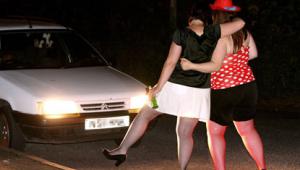28 January 2005
Local authorities found out last week how much they will be able to charge for issuing licences to pubs and bars from next month, and glasses were clinked in celebration in at least a few town halls.
Culture Secretary Tessa Jowell, flanked by Home Office minister Hazel Blears and the Local Government Association's Dame Sally Powell, unveiled the results of intensive lobbying at a January 21 press conference.
Councils, who feared they would be drowning their sorrows when they assume responsibility for licensing from February 7, say they are pleased with the deal on offer. Under the new regime, most pubs will pay between £100 and £635 for their licence application and a £70 to £350 annual fee, depending on their rateable values. This compares with the £500 application fee and £225 annual charge suggested in last year's consultation paper.
But large city centre pubs and bars will have to pay £1,905 for their licence application and a £1,050 annual fee (a hike that has provoked outrage among the drinks industry). These behemoths have been tamed by the application of a multiplier: as a result of their location, they will pay either two or three times the amount paid by similar establishments elsewhere.
Some bars might have to pay even more. Purveyors of intoxicating liquor that are implicated in customers' loutish behaviour will be ordered to shape up within eight weeks. If that fails, councils will be able to declare an alcohol disorder zone, and pubs within this will have to pay towards the extra costs of policing and cleaning up.
Pubs guilty of serving under-age drinkers could be shut down for up to 24 hours. Under-18s who get caught, meanwhile, can expect to add an £80 on-the-spot fine to the cost of a good night out.
Repeat offenders will be handed drinking banning orders, excluding them from pubs in a certain area for up to four weeks, under a 'three strikes and you're barred' regime.
Powell, who is chair of the LGA's Safer Communities board, said that the revised fees should be sufficient to cover the extra costs to most authorities. 'Of course, each area is different, so the situation will vary between individual councils, but local government as a whole is happy.'
This support will be gratefully received by Jowell. In recent months, the government's plans to extend drinking hours have been attacked by critics, who fear it will lead to a drink-fuelled upsurge in violence and vandalism.
Before the fees announcement, councils had also been arguing that, far from being cost-neutral as ministers had claimed, handing out the licences and clearing up after the predicted chaos would run into millions of pounds and fall on council tax payers.
Among the most vociferous were the London boroughs of Camden and Westminster, which each contain an exceptionally high number of licensed premises.
They warned they would be out of pocket to the tune of £3m and £4m respectively if the original fee levels were introduced, and were threatening to seek a judicial review.
While Westminster remains unimpressed, Camden has been mollified enough to drop that threat. The government now hopes the package will provide the extra money needed for the new regime, while deterring those whose perfect Saturday night consists of a pint and a punch-up.
'Our licensing laws are creaking under the strain. That's why we're reforming them, to make our towns and cities safe for all, not a free-for-all,' Jowell declared. 'We are proposing decisive action. I am confident the police, local authorities and others will come on board with us in delivering it.'
But the LGA's backing comes with an important caveat. Jowell has promised an independent review of licensing costs after 12 months.
Powell made clear that the LGA is taking this to mean the fees will be increased if necessary. 'We will keep a ledger recording all the costs – the hearings, administering the process – and we'll make it publicly available. It is an evidence-based approach and if we produce the evidence, we expect ministers to act,' she said.
If they do not, the reforms to the drinking laws might leave the government with a big hangover.
PFjan2005



















